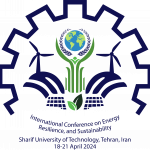Depletion of fossil fuels and the environmental impact of using fossil fuels is one of the main challenges of current energy systems. Renewable energy resources can replace the fossil fuel consumption and increase the sustainability of our energy system. Although, renewable energy sources are free and abundant, there are several challenges that should be addressed. First, the initial investment cost of infrastructures for renewable energy is higher than conventional fossil fuel facilities. This is especially an issue for countries like Iran that subsidies the fossil fuels. The second challenge is the intermittency and alternating behavior of renewable energy resources which make them hard to match with demand profiles and the third one is the lack of public knowledge of how to integrate renewable energy technologies to fulfill their energy needs.
Efforts have been done to tackle above challenges and increase the penetration of renewable energy resources into the current energy system. New cheap technologies to harvest renewable energy resources can be developed to decrease the investment cost of renewable energy systems. Design and operation optimization of renewable energy systems can also decrease the cost of delivered energy of renewable energy resources. In addition, energy storage systems (e.g. batteries) can be implemented to provide energy at the time that renewable energy resources are not available. Hydrogen technology can be also integrated in the renewable energy systems to sustain the pathways from renewable energies to consumers. Incentives can accelerate the renewable energy market and this highlights not only the role of technology developers but also the energy governance system and policy makers.
Increasing the social knowledge and acceptance of renewable energy resources is a responsibility for all. This is the main and initial driver for promoting utilization of renewable energy resources which needs top-down and bottom-up actions from different stakeholders at different levels (education systems, industries, policy makers, NGOs and the overall governance system).


